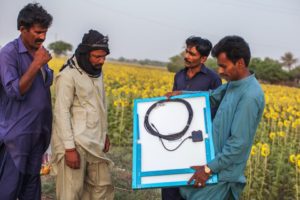Kategori : ELECTRICITY ENERGY NEWS, ENERGY AGENDA NEWS - Tarih : 04 June 2019
If the world does not step up efforts on renewable energy, it will fall short of the United Nations Sustainable Development Goals (SDGs) for 2030. This is according to a new report >>> compiled by the International Energy Agency (IEA), the International Renewable Energy Agency (IRENA), the United Nations Statistics Division (UNSD), the World Bank and the World Health Organization (WHO).
Specifically, SDG 7 sets out to “ensure access to affordable, reliable and modern energy for all”. Despite significant progress in recent years with an increasing level of global electrification, more sustained efforts are needed to reach some of the world’s poorest populations and to improve energy sustainability.  The goals for 2030 under SDG 7 are:
The goals for 2030 under SDG 7 are:
According to Riccardo Puliti, the Senior Director for Energy and Extractives at the World Bank, “The progress we have seen over the last few years is encouraging- the number of people without access to electricity has dropped to 840 million – but we still have a great deal of work to do as much of this population lives in the poorest countries and most remote locations. The successes in several countries in Africa and Asia show the way. This report demonstrates the importance of sound planning, integrating grid and off-grid approaches, a focus on affordability and reliability, and addressing gender inequalities.”
Tracking SDG7: The Energy Progress Report shows that progress has been made to increase overall renewable energy deployment. Nevertheless, ramping up the progress globally requires stronger political action, long-term energy planning, greater levels of financing along with better policy and fiscal incentives. The report follows progress on SDG 7 and identifies best practices to help policymakers understand how to mobilize to overcome the challenges. The key highlights for each target are:
1- Access to electricity: Following a decade of steady progress, the global electrification rate reached 89 percent and 153 million people gained access to electricity each year. However, the biggest challenge remains in the most remote areas globally and in sub-Saharan Africa where 573 million people still live in the dark. To connect the poorest and hardest to reach households, off-grid solutions, including solar lighting, solar home systems, and increasingly mini-grids, will be crucial. Globally, at least 34 million people in 2017 gained access to basic electricity services through off-grid technologies. The report also reinforces the importance of reliability and affordability for sustainable energy access.
2- Clean cooking: Almost three billion people remain without access to clean cooking in 2017, residing mainly in Asia and Sub-Saharan Africa. This lack of clean cooking access continues to pose serious health and socioeconomic concerns. Under current and planned policies, the number of people without access would be 2.2 billion in 2030, with significant impact on health, environment, and gender equality.
3- Renewables accounted for 17.5% of global total energy consumption in 2016 versus 16.6% in 2010. Renewables have been increasing rapidly in electricity generation but have made less headway into energy consumption for heat and transport. A substantial further increase of renewable energy is needed for energy systems to become affordable, reliable and sustainable, focusing on modern uses. As renewables become mainstream, policies need to cover the integration of renewables into the broader energy system and take into account the socio-economic impacts affecting the sustainability and pace of the transition.
4- Energy efficiency improvements have been more sustained in recent years, thanks to concerted policy efforts in large economies. However, the global rate of primary energy intensity improvement still lags behind, and estimates suggest there has been a significant slowdown in 2017 and 2018. Strengthening mandatory energy efficiency policies, providing targeted fiscal or financial incentives, leveraging market-based mechanisms, and providing high-quality information about energy efficiency will be central to meet the goal.





